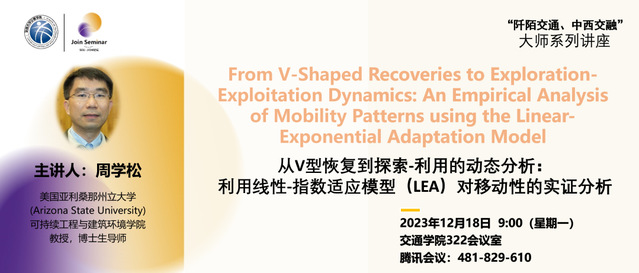
TOPIC INTRODUCTION
Today's transport systems face an unprecedented set of challenges, from natural disasters to global health crises, which have a real impact on people's daily lives. In transportation infrastructure and activity adaptivity, resilience is essential due to disruptions from natural events, human actions, and climate changes.
In this talk, I present a linear-exponential adaptation (LEA) model based on V-shaped recovery, which aims to explore how systems recover and adapt after disruptions. The model combines linear growth with exponential decay, elucidating the exploration-exploitation balance, relevant across various disciplines, including biology and operations research. The model not only adequately captures the system's response, but also reveals effective recovery strategies to prepare and provide technical guidance for future system disruptions. Although the immediate focus of this technique at this stage is on transport systems, it provides advanced insights into the exploration-exploitation trade-off, reveals commonalities in the underlying adaptive mechanisms of various types of systems, and is relevant to all fields of science. The model helps pave the way for strengthening resilience across diverse systems, emphasizing the broad importance of adaptability in today's world in essence.
ABOUT THE SPEAKER
Professor Zhou Xuesong is currently working at the School of Sustainable Engineering and the Built Environment at Arizona State University. He is the chair of the Transportation Network Modeling and Application Subcommittee (AEP40-(3)) of the Transportation Research Board (TRB) and served as the chair of the Railway Applications Section of the Institute for Operations Research and the Management Sciences (INFORMS) in 2016. Professor Zhou also holds several important positions in international transportation academic journals, including being the associate editor of Transportation Research Part C and the co-executive editor of Urban Rail Transit. As the director of the Transportation + Artificial Intelligence Laboratory at Arizona State University, Professor Zhou has developed several widely used open source software packages, such as DTALite, NEXTA, and OSM2GMNS, which have been downloaded more than 100,000 times by urban planning agencies and state transportation departments. He has published more than 100 papers in top transportation journals such as Transportation Research Part B and Transportation Research Part C, with more than 10,000 citations on Google Scholar and an H-index of 56. Professor Zhou is also dedicated to promoting collaboration among practitioners, researchers, scholars, and students in the field of transportation planning and travel modeling. He will be the chair of the Travel Analysis and Planning Innovation Conference of the Transportation Research Board in 2023 and serves as a board member of the Zephyr Foundation, a non-profit organization dedicated to promoting transportation research and education.